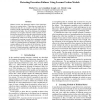Free Online Productivity Tools
i2Speak
i2Symbol
i2OCR
iTex2Img
iWeb2Print
iWeb2Shot
i2Type
iPdf2Split
iPdf2Merge
i2Bopomofo
i2Arabic
i2Style
i2Image
i2PDF
iLatex2Rtf
Sci2ools
131
click to vote
AAAI
2007
2007
Detecting Execution Failures Using Learned Action Models
reason with abstracted models of the behaviours they use to construct plans. When plans are turned into the instructions that drive an executive, the real behaviours interacting with the unpredictable uncertainties of the environment can lead to failure. One of the challenges for intelligent autonomy is to recognise when the actual execution of a behaviour has diverged so far from the expected behaviour that it can be considered to be a failure. In this paper we present an approach by which a trace of the execution of a behaviour is monitored by tracking its most likely explanation through a learned model of how the behaviour is normally executed. In this way, possible failures are identified as deviations from common patterns of the execution of the behaviour. We perform an experiment in which we inject errors into the behaviour of a robot performing a particular task, and explore how well a learned model of the task can detect where these errors occur.
Related Content
| Added | 02 Oct 2010 |
| Updated | 02 Oct 2010 |
| Type | Conference |
| Year | 2007 |
| Where | AAAI |
| Authors | Maria Fox, Jonathan Gough, Derek Long |
Comments (0)

